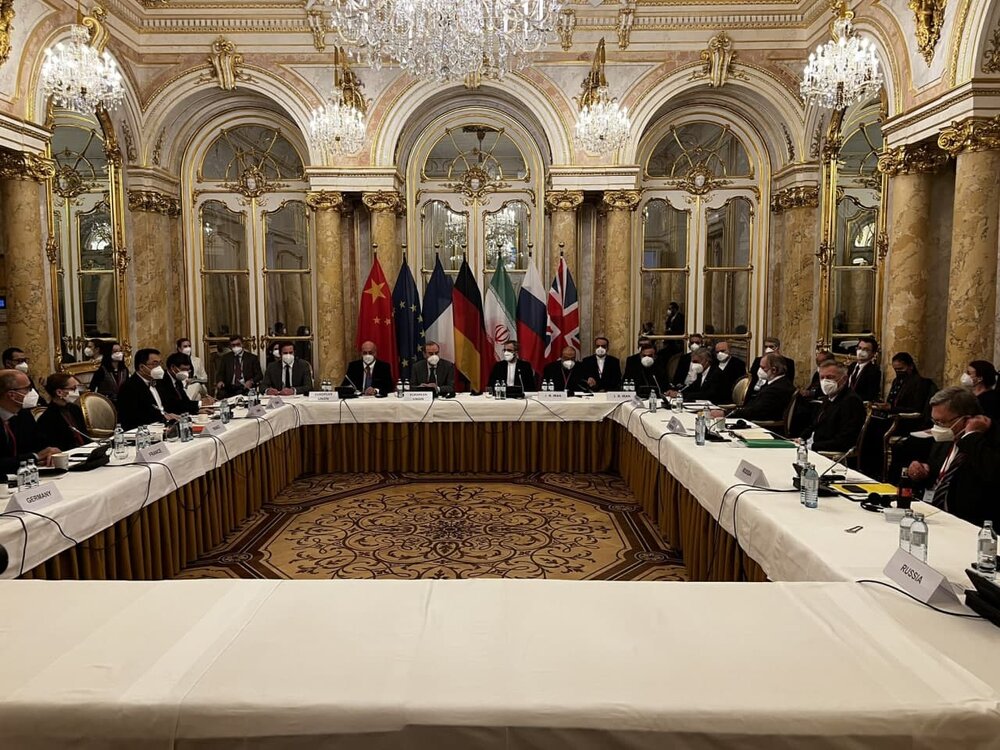JCPOA negotiators agree on ‘common understanding’ on nuclear steps, lifting sanctions: China

TEHRAN – Representatives from China, France, Germany, Russia, Britain and Iran are negotiating in Vienna to bring back the 2015 nuclear, officially called the Joint Comprehensive Plan of Action, back to life.
The United States is involved in the talks indirectly.
It is the eighth round of talks in Vienna, the Austrian capital, which started in April. Six rounds were held during the administration of Hassan Rouhani and two round in the new Ebrahim Raisi administration.
Wang Qun, the Chinese envoy to the Vienna-based international organizations, said the parties have forged a new "common text" on nuclear issues and a "common understanding" on lifting sanctions, CGTN reported on Tuesday.
“Lifting sanctions is one of the most important topics in the negotiations. Actually, there are two topics. The first one is how Iran will restrict its nuclear program. The second one is about lifting sanctions,” Wang explained.
“The biggest problem lies with the United States because the United States quit the nuclear agreement and we had to renegotiate on how the United States and Iran would resume implementation of the deal. So sanction is still a key issue,” he added.
“More consensus building”
Wang said the negotiators agreed to keep negotiating thoroughly with a focus on these key points during this round of talks.
All these consensuses laid a solid foundation for this round of talks and all parties concerned should focus on them, especially the existing ones, and work hard to expand to new areas while "properly" handling the differences, the Chinese diplomat added.
"We hope that all parties can take practical measures to jointly safeguard the current momentum and atmosphere of the negotiations and push for an early conclusion of a package solution," Wang said.
China will continue to firmly support the resumption of negotiations between the United States and Iran on implementing the agreement, participate constructively in the follow-up negotiations, and work with all parties to push for results, said the Chinese envoy.
The U.S. government under Donald Trump withdrew from the 2015 nuclear agreement in May 2018 and unilaterally re-imposed sanctions on Iran. Trump also added new sanctions on Iran under his “maximum pressure” campaign against the Islamic Republic. Iran waited for a full year to see the European parties to the JCPOA compensate the country for the sanctions, however, seeing no action, Iran gradually started to remove limits on its nuclear program in May 2019.
Under the JCPOA, Iran agreed to put limits on its nuclear activities in exchange for termination of economic and financial sanctions.
“The United States has imposed countless sanctions, ranging from primary sanctions to secondary sanctions. So we emphasized at the beginning of the talks that one should have a sense of right and wrong,” the Chinese diplomat said.
On Tuesday, Iranian Foreign Minister Hossein Amir Abdollahian expressed optimism about the ongoing talks in the Austrian capital, saying the negotiations are moving “in a good direction” and an agreement is possible if other parties show “goodwill” and “seriousness.”
“We believe that if the other sides continue the talks, which have just started in this phase, with goodwill, it will be possible for all parties to reach a good agreement for all parties and we can realize this goal,” Amir Abdollahian told reporters, according to Press TV.
“If the opposite parties show seriousness along with good faith, reaching a good agreement in the near future is conceivable,” he added.
The important point, the foreign minister added, is that the negotiating sides have reached a “unified, joint text,” which is currently the focus of the Iranian team.
He said the two sides were busy discussing and trying to reach an agreement over the outstanding issues mentioned between parentheses in the text, adding the teams “are working intensively.”
The Chinese diplomat also said sanctions must not be imposed on Iran during the negotiations and warned against “double standards” and pursuing “selfish interests".
"Sanctions should also not be used for threatening casually and new sanctions should not be introduced against Iran during the negotiations," Wang remarked.
The Joe Biden administration imposed fresh sanctions on two Iranian government agencies and several officials on December 7 during the previous round of talks.
The eighth round of negotiations during the Christmas and New Year holidays reflected the sense of urgency on all parties to resume negotiations, Wang said.
